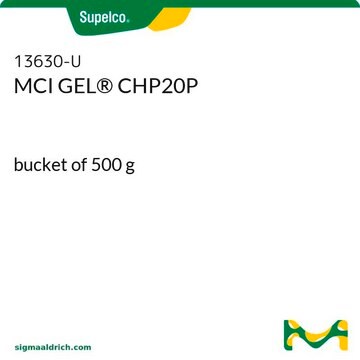13623-U
Sepabeads® SP-207 Polymeric Adsorbent
20-60 mesh, bucket of 1000 g
Faça loginpara ver os preços organizacionais e de contrato
About This Item
Produtos recomendados
Nome do produto
Sepabeads® SP-207, bucket of 1000 g
Formulário
solid
Nível de qualidade
embalagem
bucket of 1000 g
técnica(s)
LPLC: suitable
área da superfície
650 m2/g
Matriz
brominated styrene-divinylbenzene
Grupo ativo da matriz
polymer
tamanho de partícula
20-60 mesh
tamanho de poro
~1.20 mL/g pore volume
105 Å mean pore size
densidade
1.18 g/mL at 25 °C (true wet)(lit.)
técnica de separação
reversed phase
Categorias relacionadas
Descrição geral
Sepabeads® SP-207 is a nonionic polystyrene-divinylbenzene polymer resin used as column packing material. It is widely used as a adsorbent for purification in biopharmaceutical applications.
Aplicação
- Sepabeads® SP-207 was used in kinetic and thermodynamics investigation for adsorption/desorption behavio of anthocyanin pigments.
- Sepabeads® SP-207 was used as column packing material for purification of phenolic fraction.
Dense resin popular for collecting hydrophobic compounds from thick fermentation broths. The bromination makes it superior to styrene-divinylbenzene polymers: strongly hydrophobic, high density, large capacity. Especially useful with upflow fluidized bed applications.
Outras notas
Swelling in toluene = 18%
Informações legais
Diaion is a registered trademark of Mitsubishi Chemical Corp.
Sepabeads is a registered trademark of Mitsubishi Chemical Corp.
Código de classe de armazenamento
11 - Combustible Solids
Classe de risco de água (WGK)
WGK 3
Ponto de fulgor (°F)
Not applicable
Ponto de fulgor (°C)
Not applicable
Equipamento de proteção individual
Eyeshields, Gloves, type N95 (US)
Escolha uma das versões mais recentes:
Já possui este produto?
Encontre a documentação dos produtos que você adquiriu recentemente na biblioteca de documentos.
Os clientes também visualizaram
An optimal extraction solvent and purification adsorbent to produce anthocyanins from black rice (Oryza sativa cv. Heugjinjubyeo).
Kang, You Jin, Seung Won Jung, and Seung Ju Lee.
Food Technology and Biotechnology, 23, 97-106 (2014)
Irena Palíková et al.
Journal of agricultural and food chemistry, 57(15), 6584-6589 (2009-07-04)
The effect of Lonicera caerulea L. (blue honeysuckle) phenolic fraction (18.5% anthocyanins) on cell viability and against oxidative damage in low density lipoproteins (oxLDL), in rat microsomes and in primary cultures of rat hepatocytes and human umbilical vein endothelial cells
Renáta Myjavcová et al.
Journal of chromatography. A, 1217(51), 7932-7941 (2010-11-30)
Anthocyanins from the fruit Lonicera caerulea L. var. kamtschatica (blueberry honeysuckle, Caprifoliaceae) were studied via (semi)preparative chromatographic fractionation followed by MS and μLC/MS analysis. The extraction procedure was optimized with respect to analytical purposes as well as its potential use
Global Trade Item Number
| SKU | GTIN |
|---|---|
| 13623-U | 4061838506818 |
Nossa equipe de cientistas tem experiência em todas as áreas de pesquisa, incluindo Life Sciences, ciência de materiais, síntese química, cromatografia, química analítica e muitas outras.
Entre em contato com a assistência técnica






